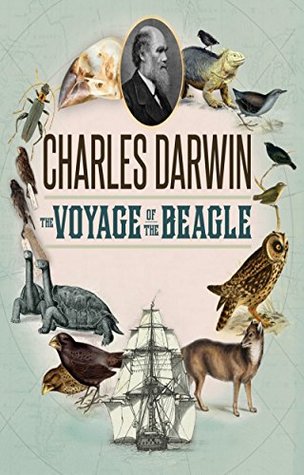More on this book
Community
Kindle Notes & Highlights
I fear it destroys the poetry of this story, that feather and dirt-feeding and parasitic insects and spiders should be the first inhabitants of newly formed oceanic land.
It not unfrequently happened, that we were obliged to kill, with stones, the poultry for our own supper.
Their politeness is excessive; they never drink their spirits without expecting you to taste it; but whilst making their exceedingly graceful bow, they seem quite as ready, if occasion offered, to cut your throat.
The Gauchos roared with laughter; they cried out that they had seen every sort of animal caught, but had never before seen a man caught by himself.
It is rather curious to find how incapable these birds must be of acquiring any notion of thickness, for although they were constantly flitting over the low wall, they continued vainly to bore through it, thinking it an excellent bank for their nests. I do not doubt that each bird, as often as it came to daylight on the opposite side, was greatly surprised at the marvellous fact.
If it had been an unnamed species, surely it ought to have been called Diabolicus, for it is a fit toad to preach in the ear of Eve.
This is a dark picture; but how much more shocking is the unquestionable fact, that all the women who appear above twenty years old are massacred in cold blood! When I exclaimed that this appeared rather inhuman, he answered, "Why, what can be done? they breed so!"
few countries have undergone more remarkable changes, since the year 1535, when the first colonist of La Plata landed with seventy-two horses. The countless herds of horses, cattle, and sheep, not only have altered the whole aspect of the vegetation, but they have almost banished the guanaco, deer and ostrich.
Certainly, no fact in the long history of the world is so startling as the wide and repeated exterminations of its inhabitants.
I could not have believed how wide was the difference between savage and civilized man: it is greater than between a wild and domesticated animal, inasmuch as in man there is a greater power of improvement.
horses. This is a very curious fact, showing the extraordinarily rapid multiplication of horses in South America. The horse was first landed at Buenos Ayres in 1537, and the colony being then for a time deserted, the horse ran wild; [2] in 1580, only forty-three years afterwards, we hear of them at the Strait of Magellan!
A fox (Canis fulvipes), of a kind said to be peculiar to the island, and very rare in it, and which is a new species, was sitting on the rocks. He was so intently absorbed in watching the work of the officers, that I was able, by quietly walking up behind, to knock him on the head with my geological hammer. This fox, more curious or more scientific, but less wise, than the generality of his brethren, is now mounted in the museum of the Zoological Society.
A bad earthquake at once destroys our oldest associations: the earth, the very emblem of solidity, has moved beneath our feet like a thin crust over a fluid;—one second of time has created in the mind a strange idea of insecurity, which hours of reflection would not have produced.
The town of Concepcion was built in the usual Spanish fashion, with all the streets running at right angles to each other; one set ranging S.W. by W., and the other set N.W. by N.
This is merely an illustration of the admirable laws, first laid down by Mr. Lyell, on the geographical distribution of animals, as influenced by geological changes. The whole reasoning, of course, is founded on the assumption of the immutability of species;
The Chilian miners are a peculiar race of men in their habits. Living for weeks together in the most desolate spots, when they descend to the villages on feast-days, there is no excess of extravagance into which they do not run. They sometimes gain a considerable sum, and then, like sailors with prize-money, they try how soon they can contrive to squander it.
I then walked up and pulled it by the tail, at this it was greatly astonished, and soon shuffled up to see what was the matter; and then stared me in the face, as much as to say, "What made you pull my tail?"
I should think a more warlike race of inhabitants could not be found in any part of the world than the New Zealanders.
I knew only three words: "good," "bad," and "yes:" and with these I answered all his remarks, without of course having understood one word he said. This, however, was quite sufficient: I was a good listener, an agreeable person, and he never ceased talking to me.
It is a most magnificent testimony to the power of the British nation. Here, in a less promising country, scores of years have done many more times more than an equal number of centuries have effected in South America. My first feeling was to congratulate myself that I was born an Englishman.
"It is certainly a fact, which cannot be controverted, that most of the diseases which have raged in the islands during my residence there, have been introduced by ships; [3] and what renders this fact remarkable is, that there might be no appearance of disease among the crew of the ship which conveyed this destructive importation."
I thank God, I shall never again visit a slave-country.


